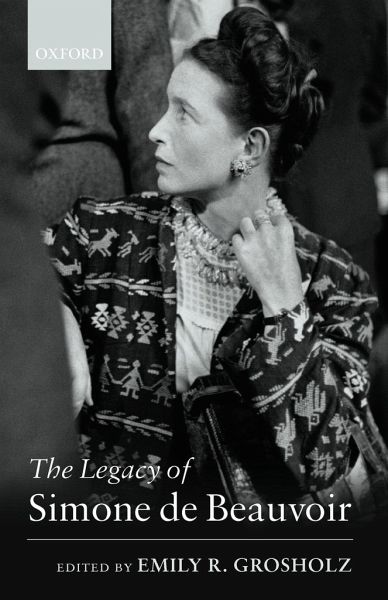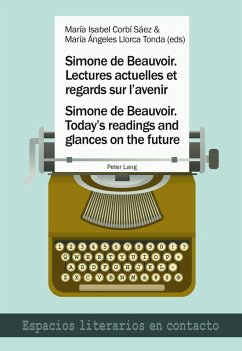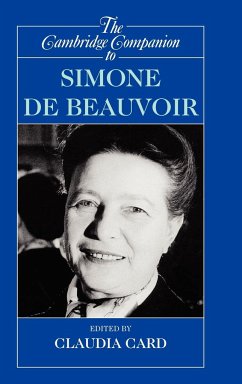
The Legacy of Simone de Beauvoir
Versandkostenfrei!
Versandfertig in 1-2 Wochen
27,99 €
inkl. MwSt.

PAYBACK Punkte
14 °P sammeln!
This collection of new essays treats the historical, philosophical, and literary dimensions of Simone de Beauvoir's thought, and celebrates the 50th anniversary of her most influential book, The Second Sex. A team of distinguished philosophers and literary critics locate her work in the intellectual and political upheavals that marked Paris in the 1930s and 1940s; analyse her philosophical links to 17th-century rationalism, and to Kant, Hegel, Merleau-Ponty,
Sartre, Simone Weil, and Heidegger; and study the connections between her philosophical and literary writings. Above all, the collection tackles the relationship between theory and concrete situation with fresh insight and renewed urgency.
Sartre, Simone Weil, and Heidegger; and study the connections between her philosophical and literary writings. Above all, the collection tackles the relationship between theory and concrete situation with fresh insight and renewed urgency.
The legacy of Simone de Beauvoir has yet to be properly assessed and explored. The 50th anniversary of the publication of The Second Sex inspired this volume which brings together philosophers and literary critics, some of whom are well known for their books on Beauvoir (Bauer, Le Doeuff, Moi), others new to Beauvoir studies though long familiar with her work (Grosholz, Imbert, James, Stevenson, Wilson).
One aim of this collection is to encourage greater recognition of Beauvoir's philosophical writings through systematic reflection on their place in the canon and on her methods. The Second Sex played a central role in the profound shift in philosophy's self-understanding that took place in the latter half of the twentieth century, and today offers new problems for reflection and novel means for appropriating older texts. Its reflective iconoclasm can be compared to that of Descartes'
Meditations; its enormous, directly discernible impact on our social world invites comparison with Locke's Two Treatises of Government.
The collection also examines the relationship between Beauvoir's literary writing and her philosophical thought. Deeply concerned with the critical and creative powers of reason as well as with the betterment of our suffering world, Simone de Beauvoir wrote in a variety of genres in addition to the philosophical essay: the novel, political journalism, and the memoir. The multiplicity of her voices was closely related to her philosophical project. Since Beauvoir's method (like that of W. E. B.
du Bois) proceeded from her own immediate experience, her reflections had to find expression sometimes as narrative, sometimes as autobiography, sometimes as argument.
The Legacy of Simone de Beauvoir demonstrates the many ways in which Beauvoir's writings, in particular The Second Sex, can serve as resources for thought, for the life of the mind which is as concerned with the past and future as it is with the present.
One aim of this collection is to encourage greater recognition of Beauvoir's philosophical writings through systematic reflection on their place in the canon and on her methods. The Second Sex played a central role in the profound shift in philosophy's self-understanding that took place in the latter half of the twentieth century, and today offers new problems for reflection and novel means for appropriating older texts. Its reflective iconoclasm can be compared to that of Descartes'
Meditations; its enormous, directly discernible impact on our social world invites comparison with Locke's Two Treatises of Government.
The collection also examines the relationship between Beauvoir's literary writing and her philosophical thought. Deeply concerned with the critical and creative powers of reason as well as with the betterment of our suffering world, Simone de Beauvoir wrote in a variety of genres in addition to the philosophical essay: the novel, political journalism, and the memoir. The multiplicity of her voices was closely related to her philosophical project. Since Beauvoir's method (like that of W. E. B.
du Bois) proceeded from her own immediate experience, her reflections had to find expression sometimes as narrative, sometimes as autobiography, sometimes as argument.
The Legacy of Simone de Beauvoir demonstrates the many ways in which Beauvoir's writings, in particular The Second Sex, can serve as resources for thought, for the life of the mind which is as concerned with the past and future as it is with the present.












